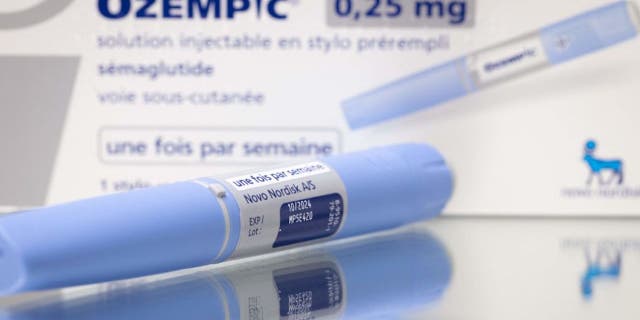
[ad_1]
This story discusses suicide. If you or someone you know is having thoughts of suicide, please contact the Suicide & Crisis Lifeline at 988 or 1-800-273-TALK (8255).
The popular medications Ozempic and Saxenda — both made by Novo Nordisk in Denmark — are under investigation after a small number of users experienced an increase in thoughts of suicide and self-harm, the European Medicines Agency (EMA) reported.
Three people reported the symptoms in Iceland — two linked to Ozempic, one to Saxenda — which sparked the EU’s safety review, according to multiple reports.
Both drugs are glucagon-like peptide 1 (GLP-1) agonists, which have the dual effect of controlling blood sugar and aiding in weight loss.
OZEMPIC-WEGOVY PILL MAY BE ON THE WAY: TRIAL SHOWS PROMISING RESULTS FOR NEW WEIGHT LOSS TABLET
Ozempic, an injectable semaglutide, is marketed for the management of type 2 diabetes.
Saxenda, which contains liraglutide, is intended as a weight-loss medication.

The popular medications Ozempic and Saxenda — both made by Novo Nordisk in Denmark — are under investigation after a small number of users experienced an increase in thoughts of suicide and self-harm. (iStock)
The EMA’s Pharmacovigilance Risk Assessment Committee (PRAC) will also look into whether other GLP-1 medications should be investigated, per reports.
Dr. Marc Siegel, professor of medicine at NYU Langone Medical Center and a Fox News medical contributor, noted that “an association doesn’t prove causality.”

Ozempic, an injectable semaglutide, is marketed for the management of type 2 diabetes. (Getty Images)
“It could have more to do with people who are requesting these drugs in the first place — their obesity or other medical or psychological issues could be occurring at the same time and could be independent,” he told Fox News Digital.
“Having said that, this does need to be carefully addressed because these drugs (semaglutides) do affect hormones in the brain, and the impact on nutrition can also impact brain function,” Siegel added.
“These drugs do affect hormones in the brain.”
The increased risk of suicidal ideation associated with GLP-1 drugs has been known since the clinical trials, according to Dr. Angela Fitch, co-founder and chief medical officer of knownwell, an in-person and telehealth “weight-inclusive” health care company based in Boston.
“This risk is very small, but increased above placebo,” Fitch told Fox News Digital.
“This data is available in the trials, and suicidal ideation is a listed side effect of many of our obesity medications.”
OZEMPIC, WEGOVY AND PREGNANCY RISK: WHAT YOU NEED TO KNOW ABOUT THE ISSUE
The effect is also complicated by a patient’s relationship with food — particularly if the patient tends to use food as a coping mechanism for emotions, Fitch said.
“If you take away the desire to eat and some of the satisfaction of eating, this can be emotionally challenging,” she said.

The increased risk of suicidal ideation associated with GLP-1 drugs has been known since the clinical trials, according to a Boston doctor. (iStock)
In light of this risk, Fitch emphasized the importance of taking these medications as part of a comprehensive chronic disease management plan in a supportive clinic model, so that health care professionals can monitor for side effects, make adjustments in the treatment plan and provide emotional support.
CLICK HERE TO SIGN UP FOR OUR HEALTH NEWSLETTER
A Novo Nordisk representative released the following statement.
“GLP-1 receptor agonists have been used to treat type-2 diabetes for more than 15 years and for treatment of obesity for eight years, including Novo Nordisk products such as semaglutide and liraglutide that have been in the U.K. market since 2018 and 2009 respectively.”
CLICK HERE TO GET THE FOX NEWS APP
“The safety data collected from large clinical-trial programs and post-marketing surveillance have not demonstrated a causal association between semaglutide or liraglutide and suicidal and self-harming thoughts.”
Fox News Digital reached out to the company for further comment.
[ad_2]
Source link